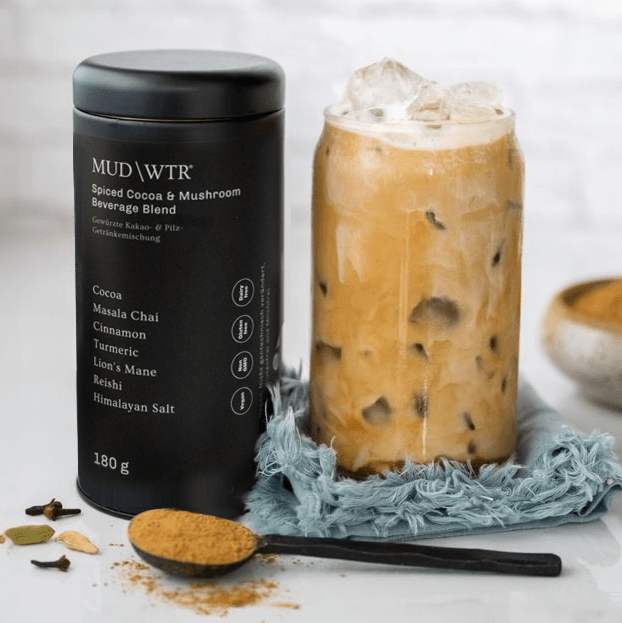In the quest for the perfect morning cuppa, the age-old debate between tea and coffee often surfaces. Both beverages have their loyalists, each touting their drink of choice for its unique benefits and flavours.
However, a new player has entered the arena, offering a blend that might just tip the scales. MUD\WTR's :rise Cocoa, a mushroom alternative coffee, is not just a beverage; it's an experience that combines the best of both worlds with a unique twist.
The Great Debate: Tea vs. Coffee
Tea, known for its calming effects, has been a staple in many cultures for centuries. It contains L-theanine, an amino acid that promotes relaxation without drowsiness, making it a popular choice for a gentle morning start (Dietz & Dekker, 2017). Coffee, on the other hand, is famed (rightly or wrongly) for its robust flavour and high caffeine content, providing a much-needed energy boost to kickstart the day (Poole et al., 2017).
The Health Perspective
From a health standpoint, both tea and coffee have their merits. Tea is rich in antioxidants, particularly catechins, which have been linked to various health benefits, including reduced risk of cancer, heart disease, and diabetes (Zheng et al., 2016). Coffee, too, is a powerful antioxidant source and has been associated with a lower risk of several diseases, including Parkinson's and Alzheimer's (Grosso et al., 2017).
However, the high caffeine content in coffee can be a double-edged sword. While it boosts energy and concentration, it can also lead to increased heart rate, anxiety, and disrupted sleep patterns in sensitive individuals (Clark & Landolt, 2017).
Enter MUD\WTR :rise Cocoa
MUD\WTR's :rise Cocoa offers a unique alternative that bridges the gap between tea and coffee. This innovative blend includes ingredients like lion's mane, reishi, cinnamon, and chai, each bringing its own set of benefits to the table.
The Power of Mushrooms
Lion's mane, a key ingredient in :rise Cocoa, is a mushroom known for its cognitive-enhancing properties, making it an excellent addition to a morning brew (Mori et al., 2009).
Reishi, another mushroom in the blend, is often referred to as the "mushroom of immortality" in Eastern medicine. Nonetheless, it’s a great complement to the energizing effects of lion's mane (Wachtel-Galor et al., 2011).
The Spice of Life
Cinnamon and chai not only add a delightful flavour to :rise Cocoa but also come with their own health benefits. Cinnamon has been shown to have antioxidant properties, and Chai, a blend of spices including ginger, cardamom, and cloves, has been linked to improved digestion and heart health (Srivastava et al., 2010).
The Taste Experience
When it comes to flavour, MUD\WTR's :rise Cocoa stands out. It offers a rich, earthy taste with a hint of sweetness from the cinnamon and a subtle spice from the chai. This unique combination provides a satisfying and comforting experience, perfect for those who want something different from your tired old cuppa.

The Verdict
So, is it better to drink tea or coffee in the morning? The answer might just be neither. MUD\WTR's :rise Cocoa offers a compelling alternative that combines the health benefits of both tea and coffee with the added advantages of medicinal mushrooms and spices. It's a beverage that not only energizes and revitalizes but also supports overall health and well-being.
For those looking to break away from the traditional tea or coffee routine, :rise Cocoa presents an exciting and delicious option. It's more than just a drink; it's a ritual that nurtures both the body and the mind.
References
- Dietz, C., & Dekker, M. (2017). Effect of Green Tea Phytochemicals on Mood and Cognition. Current Pharmaceutical Design, 23(19), 2876-2905.
- Poole, R., Kennedy, O. J., Roderick, P., Fallowfield, J. A., Hayes, P. C., & Parkes, J. (2017). Coffee consumption and health: umbrella review of meta-analyses of multiple health outcomes. BMJ, 359, j5024.
- Zheng, X. X., Xu, Y. L., Li, S. H., Liu, X. X., Hui, R., & Huang, X. H. (2016). Green tea intake lowers fasting serum total and LDL cholesterol in adults: a meta-analysis of 14 randomized controlled trials. The American Journal of Clinical Nutrition, 94(2), 601-610.
- Grosso, G., Micek, A., Castellano, S., Pajak, A., & Galvano, F. (2017). Coffee, tea, caffeine and risk of depression: A systematic review and dose-response meta-analysis of observational studies. Molecular Nutrition & Food Research, 61(1).
- Clark, I., & Landolt, H. P. (2017). Coffee, caffeine, and sleep: A systematic review of epidemiological studies and randomized controlled trials. Sleep Medicine Reviews, 31, 70-78.
- Mori, K., Inatomi, S., Ouchi, K., Azumi, Y., & Tuchida, T. (2009). Improving effects of the mushroom Yamabushitake (Hericium erinaceus) on mild cognitive impairment: a double-blind placebo-controlled clinical trial. Phytotherapy Research, 23(3), 367-372.
- Wachtel-Galor, S., Yuen, J., Buswell, J. A., & Benzie, I. F. F. (2011). Ganoderma lucidum (Lingzhi or Reishi): A Medicinal Mushroom. In Herbal Medicine: Biomolecular and Clinical Aspects (2nd ed.). CRC Press/Taylor & Francis.
- Rao, P. V., & Gan, S. H. (2014). Cinnamon: A Multifaceted Medicinal Plant. Evidence-Based Complementary and Alternative Medicine, 2014.
- Srivastava, J. K., Shankar, E., & Gupta, S. (2010). Chamomile: A herbal medicine of the past with a bright future. Molecular Medicine Reports, 3(6), 895-901.







